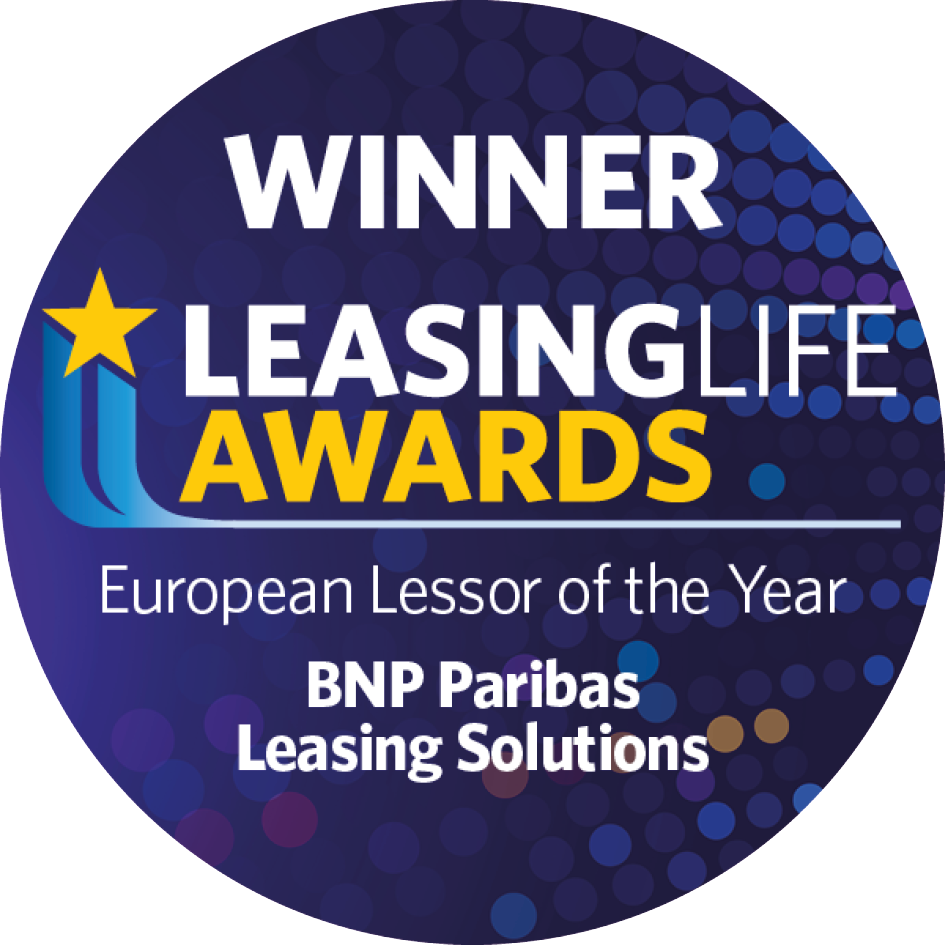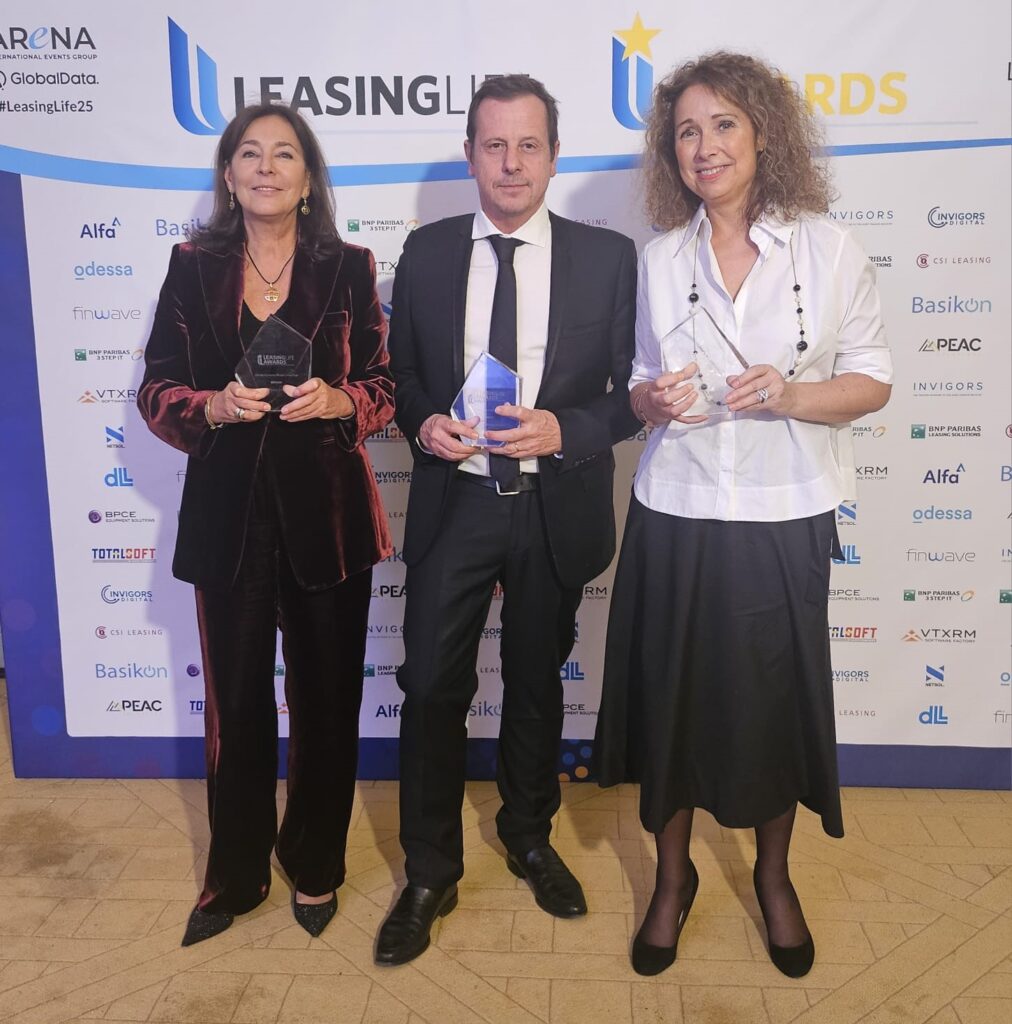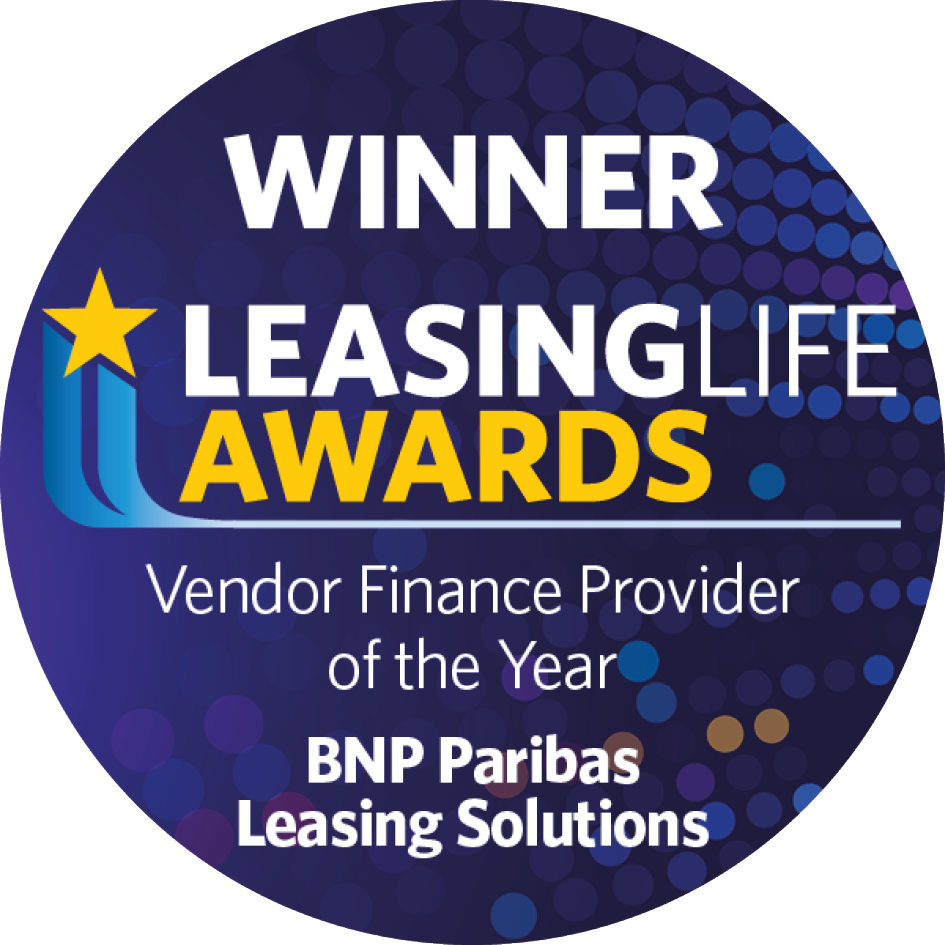Discover how we empower our people to shape a better future.
Discover more >>
In our first article, Unlocking the Circular Economy Through Use, we shared how our purpose reflects a long-term ambition – and why progressing towards more circular models requires practical, collaborative action.
One of the most important levers in this journey is usage.
At BNP Paribas Leasing Solutions, our purpose commits us to unlocking the circular economy to sustain the world we share. Turning this ambition into reality requires more than intention. It requires business models that support longer asset lifecycles, improved resource efficiency and responsible end-of-use management.
This is not simply a change in terminology. Usage transforms how organisations access equipment, manage it over time and create value. It reshapes incentives and responsibilities across the entire asset lifecycle.
For decades, economic performance was largely built on ownership. In a context of resource constraints, rapid technological change and rising environmental expectations, this model is increasingly under pressure.
At BNP Paribas Leasing Solutions, we advocate a different approach: use better rather than own more. By prioritising performance and longevity over volume, usage-based models help reduce waste and improve asset productivity.
Usage enables organisations to optimise utilisation, extend lifecycles and limit losses linked to underuse or premature obsolescence. It also supports more flexible solutions that can adapt to evolving operational needs.
Leasing: A Model Built Around Usage
By design, leasing and rental solutions are based on access rather than ownership. They enable organisations to benefit from high-performing equipment while integrating a longer-term perspective on maintenance, performance and end-of-use management.
Within a usage logic, leasing and rental can contribute to circularity in several ways:
- assets are more systematically monitored and maintained
- repair, refurbishment and redeployment are facilitated
- residual value is actively managed across multiple usage cycles
This structured approach helps preserve asset value while improving environmental performance. According to the European Environment Agency, extending product lifespans is among the most effective levers for reducing environmental impact.
In this context, leasing can act as a connector between manufacturers, users, service providers and second-life operators – helping to build more integrated lifecycle ecosystems.
Towards More Advanced Usage-Based Models
Beyond traditional leasing, more advanced models are emerging, including Product-as-a-Service (PaaS). In these approaches, value is increasingly linked to performance or service outcomes rather than product ownership.
Such models encourage:
- more durable and repairable product design
- optimised maintenance strategies
- improved end-of-life planning and recovery
They also require adapted financial, contractual and data frameworks to manage long-term performance and risk.
While these models are still developing, they illustrate how usage-based approaches can further align economic and environmental objectives.
Progress Through Partnership
As highlighted in our first article, circularity depends on collective action.
Progress relies on close collaboration between manufacturers, distributors, service providers, users and recyclers. No single actor can deliver systemic change alone.
Our role is to help connect these stakeholders, structure sustainable financing solutions and support the maturity of usage-based ecosystems over time.
By supporting this transition, we help organisations balance operational efficiency, environmental responsibility and long-term value creation. We create the conditions for assets to be used more intensively, maintained more effectively and retained within circular systems for longer.
Progress remains gradual. Capabilities continue to evolve. But by working step by step with our partners, we are contributing to the long-term maturity of the circular economy – in line with our purpose to sustain the world we share.
At BNP Paribas Leasing Solutions, our purpose is clear: we are committed to unlocking the circular economy to sustain the world we share.
This ambition guides our strategy, our solutions and our long-term commitments. But it can only become a reality through the people who bring it to life every day: our employees.
Delivering on our purpose requires more than strong intentions. It requires engaged, skilled and supported teams who are empowered to contribute, develop and thrive. That is why our employer promise is built around three pillars: Shape, Grow and Thrive.
Together, they reflect how we support our people in contributing to a more sustainable future – while building meaningful and rewarding careers.
Shape a Better Future
Shape is about enabling our employees to actively contribute to the transformation of our business and operating models. We encourage initiative, collaboration and innovation so that everyone can have a tangible impact – on our activities, our customers and the communities we serve.
By involving our teams in the development of responsible, forward-looking solutions, we create opportunities to turn ambition into action.
Grow Your Career
The transition towards more sustainable and resilient models requires strong, evolving skills and continuous learning. Through Grow, we support our employees in developing their expertise, expanding their career paths and strengthening their long-term employability.
Training programmes, mobility opportunities and personalised development pathways enable our people to progress – while reinforcing our collective ability to respond to economic, environmental and technological change.
By investing in talent, we invest in our future.
Thrive in a Positive Culture
Thrive means creating the conditions for everyone to flourish – professionally and personally.
We are committed to fostering a working environment built on trust, inclusion, diversity and well-being. We promote respectful dialogue, work-life balance and psychological safety, recognising that sustainable performance depends on engaged and fulfilled teams.
A positive culture is not an aspiration. It is a responsibility we take seriously every day.
A Purpose Powered by People
Our purpose is ambitious. Delivering it requires people who are empowered, supported and inspired.
By helping our employees Shape, Grow and Thrive, we enable them to fully contribute to our mission – and to their own professional journey. Together, we are building a company capable of addressing the challenges of the transition to more circular, responsible and inclusive models.
Because unlocking the circular economy starts with unlocking the potential of our people.
At BNP Paribas Leasing Solutions, our purpose is clear: we are committed to unlocking the circular economy to sustain the world we share.
This purpose reflects an ambition. It recognises both the urgency of environmental challenges and the responsibility of financial services to support more sustainable models of production and consumption. It guides our long-term direction and informs how we work with partners at a time when organisations are rethinking business models to balance performance, resilience and sustainability.
We are not claiming to have “solved” circularity. We are on a journey – working step by step with our partners to make circular practices more mature, more scalable and more impactful over time.
What the Circular Economy Means – and Why It Matters
The circular economy offers an alternative to the traditional linear model of take, make, use, dispose. Instead, it aims to:
- reduce pressure on natural resources
- extend the useful life of products and components
- keep materials and assets in circulation for longer through reuse, refurbishment, remanufacturing and recycling
This transition is now a priority in Europe, notably through the European Commission’s Circular Economy Action Plan, which encourages longer product lifespans, improved end-of-life management, and the development of usage-based economic models.
Beyond environmental considerations, circularity also represents a significant economic opportunity. According to the Ellen MacArthur Foundation, circular business models could unlock trillions of dollars of value globally, while helping rebalance resource consumption with ecosystem regeneration.
For businesses, this means rethinking not only how products are designed and manufactured, but also how they are financed, maintained, used and recovered.
Why Usage Matters More Than Ownership
At BNP Paribas Leasing Solutions, we see use rather than ownership as a practical lever for advancing circularity.
When assets are financed through usage-based models such as leasing or rental, responsibility for performance and value is shared across the lifecycle. This creates incentives to manage equipment more actively and sustainably.
In practice, usage models can help to:
- optimise asset utilisation through monitoring, servicing and structured maintenance programmes
- extend lifecycles by enabling repair, refurbishment and component replacement rather than premature disposal
- improve end-of-use outcomes by facilitating asset recovery for reuse or recycling
Crucially, usage models make it easier to keep assets within professional management frameworks, where their condition, performance and residual value can be actively managed over time.
Our Commitment in Action
Bringing our purpose to life means working collaboratively across the value chain.
Today, our focus is on:
- supporting partners in developing usage-based commercial offers
- integrating financing into asset lifecycle strategies
- helping to develop secondary markets and asset recovery processes
We recognise that progress depends on collective action. Circularity cannot be delivered by finance alone. It requires alignment between manufacturers, service providers, users, recyclers and policymakers. Our role is to help connect these stakeholders and remove financial barriers to more sustainable practices.
A Journey Towards a Sustainable and Shared Future
At BNP Paribas Leasing Solutions, we do more than finance equipment. We support businesses in moving towards more sustainable patterns of consumption – where value is created through performance and longevity, not volume and disposability.
We are still building capabilities. Many circular models remain at an early stage. Measurement frameworks, infrastructure and market maturity continue to evolve. There is more to do.
But by focusing on usage, partnerships and lifecycle management, we are laying practical foundations for progress.
Our purpose reflects this long-term commitment: to unlock the circular economy to sustain the world we share – step by step, together with our partners and clients.
Innovative solution delivers automated financial relief, boosting resilience and cash flow for farmers affected by extreme weather conditions.
Madrid, Spain – 2 February 2026
CNH Capital together with BNP Paribas Leasing Solutions, and in collaboration with Shepherd Compello and Swiss Re, today announced the launch of an innovative Parametric Service designed to offer a new level of financial security to agriculture customers across Europe.
How the Parametric Service works
Unlike insurance, which often requires lengthy assessments, this new service is built on transparency and speed. It is a contractual parametric service integrated directly into CNH Capital’s financing agreements and is designed to mitigate the financial cost of machine “non-use” during periods of extreme weather.
- Parameter-Driven: the service is activated automatically when pre-agreed weather triggers – based on the intensity and duration of excess rain or drought – are met, as measured by independent, verifiable data satellite sources.
- Automatic Reimbursement (no claim required): since the payout is triggered by objective weather data rather than physical damage to the machine, the customer does not need to submit documentation or undergo a complex claims process.
- Financial Support: upon activation, the customer automatically receives a reimbursement equivalent to one monthly installment (per year). This provides a cash flow injection exactly when adverse weather disrupts their operations.
The service begins its phased rollout this month, starting in Spain, with a plan for broader European availability throughout 2026.
Executive perspectives on the partnership
This initiative builds on Swiss Re’s parametric experience, leverages Shepherd Compello’s specialized risk expertise to further strengthen the 25-year Joint Venture between CNH Capital and BNP Paribas Leasing Solutions.
Elias Mendes, Head of CNH Capital in EMEA, states: “This partnership is a testament to our unwavering commitment to the sustainability and operational resilience of our customers in Europe. Agriculture is increasingly impacted by climate volatility, and this service provides a simple, immediate financial safety net. By leveraging our long-standing Joint Venture with BNP Paribas Leasing Solutions and working with Shepherd Compello and Swiss Re, we have embedded innovation directly into our financing, ensuring our customers have the flexibility to manage external risks.”
Stefania Mancuso, Business Developer Officer at Shepherd Compello, adds: “Our primary goal was to design a responsive risk transfer mechanism that prevents the risk of traditional approaches. The parametric model is the future of climate risk management because it is driven by independent, verifiable data. This system provides certainty and automatic liquidity when weather conditions prevent farmers from using their equipment, ensuring they can focus on recovery rather than bureaucracy.”
Florence Roussel Pollet, CEO for the JV in BNP Paribas Leasing Solutions, comments: “Integrating this service seamlessly into the equipment financing offer enhances the value proposition we bring to the market. It represents a new milestone in our 25-year partnership with CNH Capital, demonstrating how financial services can evolve to properly address the customers’ needs and here manage climate risks and support the essential activities of the agricultural sector. Our collaboration reinforces our commitment to financial innovation and as a result to the long-term success of our mutual customers.”
Gianni Biason, Senior Underwriter Special Risks at Swiss Re, concludes: “We’re pleased to have worked together to design an innovative solution that will deliver real value to farmers in Spain facing more frequent weather risks. The cooperation with CNH Capital, Shepherd Compello and BNP Paribas Leasing Solutions is a strong example of how we work with our partners to bring parametric solutions to the market, while creating a scalable model that can be replicated across countries.”
ABOUT THE PARTNERS
CNH Capital is the captive financial provider for the CNH family of brands, specializing in agricultural and construction equipment and technologies. CNH Capital supports customers and dealers with a dedicated suite of financial solutions through various wholly owned subsidiaries, joint ventures, and vendor programs around the world. www.cnhcapital.com
Shepherd Compello is a specialized Lloyd’s insurance broker focused on innovative risk management and bespoke insurance solutions for corporate clients globally. They specialize in creating data-driven parametric solutions that address modern environmental and operational challenges. www.shepherdcompello.com
BNP Paribas Leasing Solutions offers capital-efficient business equipment financing in key sectors including agriculture, construction, transportation, and green tech. As part of the BNP Paribas Group, it supports the transition to a low-carbon circular economy through market expertise and asset know-how. www.leasingsolutions.bnpparibas.com
The Swiss Re Group is one of the world’s leading providers of reinsurance, insurance and other forms of insurance-based risk transfer, working to make the world more resilient. It anticipates and manages risk – from natural catastrophes to climate change, from ageing populations to cyber crime. Swiss Re has a Centre of Competence for parametric insurance and feature tens of years of experience in both parametric insurance and reinsurance. www.swissre.com
For more information contact:
Marzia Paciantoni Financial Services EMEA Communication and Branding, CNH Capital
Emily Power Marketing and Communication, Shepherd Compello
E: emily.power@shepherdglobal.com
Suhale Vorajee Corporate Communications, BNP Paribas Leasing Solutions
E: suhale.vorajee@bnpparibas.com
Media Relations Swiss Re
E: media_relations@swissre.com

Since 1997, the joint venture (JV) between CNH and BNP Paribas Leasing Solutions has been empowering customers across Central Europe with flexible, integrated financing. By combining industrial and financial expertise, the partnership helps businesses invest efficiently in agricultural and construction equipment – fuelling productivity, innovation, and long-term customer value.
What began as a financial partnership has evolved into a strategic alliance that strengthens sales, deepens customer relationships, and drives transformation across industries.
“The JV allows us to deliver competitive financing solutions directly integrated with equipment sales,” says Doug MacLeod, President, Financial Services at CNH. “It’s not just about funding – it’s about building loyalty and making financing a strategic business driver.”
Operational excellence through collaboration
One of the JV’s greatest strengths is its collaborative governance model. Regular steering meetings and operational reviews enhance coordination, decision-making, innovation and speed to market.
“These structures improve communication and help us act quickly, streamlining information flows and reducing risk,” explains Florence Roussel Pollet, CEO for the JV. “Together, we adapt our processes to local market realities to maintain operational excellence.”
Digitalisation is also transforming the way the JV operates. New self-serve portals for partners and clients, along with tools to track dealer satisfaction, are streamlining sales cycles and embedding a culture of continuous improvement and consistent customer experience.
“Having a joint venture with a trusted partner has allowed us to grow with certainty of funding and a controlled cost of risk,” adds Doug. “Digital tools have made us faster, more agile, and they allow us to provide an exceptional customer experience.”
Financing the future: Sustainability and transformation
As industries transition toward greener, smarter technologies, the JV is helping customers finance sustainable solutions. CNH’s environmental ambitions are reinforced by tailored financial products that support the adoption of alternative energy equipment and circular-economy practices.
“Sustainability is a core focus for us,” notes Doug. “We’re developing financial products that support biomethane and electric machines, remanufactured parts, and insurance solutions that protect against climate-related risks.”
These initiatives directly advance CNH’s Environmental, Social and Governance (ESG) strategy – driving both environmental responsibility and customer resilience.
Supporting new business models
The rise of connected equipment and service-based models is reshaping how customers finance and use machinery. The JV is pioneering flexible options – such as rental and pay-per-use models – integrated with data-driven services that enhance total cost of ownership and customer experience.
“Our latest-generation machines are fully connected,” says Doug. “This creates opportunities for innovative financing models and positions our sales teams as trusted advisors who understand customers’ operational and financial needs.”
A shared vision for the future
Within the JV, roles are clearly defined yet deeply complementary. CNH leads on sales and marketing, while BNP Paribas Leasing Solutions manages underwriting, funding, and customer service. Many functions are co-managed, underpinned by a strong ‘One Team’ mindset that has been developed and reinforced over the years.
“We each bring our strengths to the table,” says Florence. “The key is collaboration and trust – working together toward a single goal: supporting customers and helping them grow.”
As industries continue to evolve toward sustainability, connectivity, and intelligent mobility, the CNH–BNP Paribas Leasing Solutions JV will remain a cornerstone of customer value – combining industrial expertise and financial innovation to help businesses invest, grow, and transform for the future.
Berlin, 20 November 2025 – BNP Paribas Leasing Solutions has been recognised as European Lessor of the Year and Vendor Finance Provider of the Year at the 22nd annual Leasing Life Conference and Awards Ceremony, held in Berlin. This flagship event in the European leasing calendar brings together senior leaders from across the industry to share insights and shape the future of leasing.
During the conference, Pascale Favre, Head of IBL TLS at BNP Paribas Leasing Solutions, and Sebastien Urfels, Country Manager Germany at BNP Paribas 3 Step IT, shared their perspectives on the evolving leasing landscape. They emphasised the strengths of leasing and the critical role of managing the entire equipment lifecycle to create efficient ecosystems that deliver value for partners and clients.
The evening concluded with the prestigious Awards Ceremony, where BNP Paribas Leasing Solutions proudly received two major accolades:
- European Lessor of the Year
- Vendor Finance Provider of the Year
In addition, BNP Paribas 3 Step IT – the joint venture between BNP Paribas Leasing Solutions and 3stepIT – was honoured with the award for Best Circular Economy Model.
These achievements reaffirm BNP Paribas Leasing Solutions’ position as a European leader in equipment leasing and underscore its commitment to innovation, sustainability, and delivering value to clients and partners.



About BNP Paribas Leasing Solutions
BNP Paribas Leasing Solutions offers capital-efficient business equipment financing solutions in key sectors including agriculture, construction, transportation, materials handling, ICT, healthcare, and green tech. Drawing on its 70-year history, its partners and clients rely on its market expertise, asset know-how, and advisory services to propel their growth, transformation, and transition to a low-carbon circular economy. Present in 18 countries across Europe and Türkiye, and employing over 3 000 experts, BNP Paribas Leasing Solutions also offers vendor finance solutions in the USA and Canada in partnership with Bank of Montreal, and in China through a joint venture with Jiangsu Financial Leasing. In 2024, BNP Paribas Leasing Solutions advanced €16.3 billion in asset finance and presently manages a €40.4 billion leased asset portfolio. BNP Paribas Leasing Solutions is fully owned by BNP Paribas and is positioned within the Group’s Commercial, Personal Banking & Services division.
The rapid growth of e-commerce and demand for faster deliveries are putting unprecedented pressure on intralogistics and warehouse operations. Businesses now face the dual challenge of optimising logistics flows while keeping costs under control.
One of the most effective strategies to meet this challenge is material handling equipment leasing. By financing material handling equipment such as forklifts, automated guided vehicles (AGVs), and stackers, companies can boost productivity, preserve cash flow, and gain access to cutting-edge technology – without heavy upfront investments.
Why Choose Handling Equipment Leasing?
Leasing offers significant advantages over outright purchase, making it a strategic choice for supply chain and warehouse operators:
- Financial flexibility – Improve cash flow optimisation for logistics by spreading costs over the contract term. Avoid large upfront investments and preserve capital for growth initiatives.
- Financing the entire project for a longer duration than traditional term loan – Hardware, installation, civil engineering works and real estate without impacting client’s CAPEX.
- Access to the latest technology – Regularly upgrade to the newest forklifts, AGVs, or warehouse automation solutions to stay competitive.
- Sustainability benefits – Leasing supports sustainable warehouse operations by enabling faster adoption of more energy-efficient equipment.
Forklift Leasing: Driving Productivity and Safety
Forklifts remain the backbone of logistics operations in warehouses and distribution centres. With forklift leasing, businesses can:
- Reduce initial costs compared to outright purchase.
- Access models with advanced safety features and energy-efficient designs.
- Quickly scale fleets to meet seasonal or unexpected demand.
For companies asking, “How to finance forklifts for warehouses?” — leasing is a flexible and cost-effective solution.
AGV Leasing: Automating Logistics Flows
Automated Guided Vehicles (AGVs) are transforming logistics through automation. With AGV leasing, companies can:
- Automate repetitive tasks and free up teams for higher-value work.
- Adapt operations to changing volumes and business needs.
- Experiment with robotics solutions at lower financial risk.
For those considering “the benefits of leasing AGVs vs buying”, leasing offers unmatched flexibility to scale and upgrade as automation technology evolves. .
Stacker Leasing: Maximising Storage Capacity
Stackers are essential for maximising warehouse storage efficiency. By choosing stacker leasing, businesses can:
- Increase storage density without costly warehouse expansions.
- Reduce the need to rent additional space.
- Enhance operational flexibility with secure and efficient stacking solutions.
This makes stacker leasing ideal for businesses searching for affordable leasing options for logistics equipment.
Transform Logistics into a Competitive Advantage
In an era where supply chain efficiency determines competitiveness, leasing is more than a financing option – it’s a strategic enabler.
Whether it’s forklift leasing, AGV leasing, or warehouse automation financing, equipment leasing helps businesses:
- Optimise logistics flows.
- Reduce costs.
- Access the latest intralogistics technology.
- Improve flexibility and sustainability.
Contact us to explore flexible financing solutions for material handling equipment.
Frequently Asked Questions About Handling Equipment Leasing
1. How to finance forklifts for warehouses without heavy upfront costs?
The most cost-effective way is through forklift leasing. Instead of purchasing forklifts outright, leasing allows you to spread payments over time, preserve capital, and benefit from included maintenance. This makes it easier to modernise warehouse fleets without straining cash flow.
2. What are the benefits of leasing AGVs vs buying?
Leasing Automated Guided Vehicles (AGVs) offers flexibility, lower risk, and easier upgrades. Buying AGVs often requires significant upfront investment and locks you into specific technology. Leasing enables you to scale fleets as volumes change, adopt the latest robotics, and control costs more predictably.
3. Is warehouse automation financing available for robotics like automated storage and retrieval systems?
Yes. Many businesses are now turning to warehouse automation financing to deploy advanced systems such as automated storage and retrieval solutions. Leasing spreads the cost, reduces initial investment, and accelerates adoption of cutting-edge robotics without compromising financial stability.
4. Are leasing solutions for logistics equipment sustainable?
Yes. Sustainable warehouse operations benefit from leasing because companies can replace older, less efficient equipment more frequently. Leasing also makes it easier to adopt energy-efficient forklifts, stackers, and AGVs, reducing both operating costs and environmental impact.
[Milan / Paris, 30 October 2025] – Nidec Conversion, a business segment of Nidec Group, and BNP Paribas Leasing Solutions, Europe’s leading provider of equipment financing, today announced a strategic partnership to accelerate the adoption of e-mobility infrastructure and energy-efficient technologies across Europe.
The partnership covering Italy, Spain, DACH, BeNe, France, UK, Norway, Finland, Sweden, Poland and Romania, will make it easier for customers to acquire and deploy Nidec Conversion’s products and services through capital-efficient financing solutions. These solutions will support a wide range of customers including charging point operators, fleet managers, gas stations, service providers, and retailers.
This collaboration will offer financing for Nidec Conversion’s electric vehicle charging infrastructure (EVCI) equipment and services. The packages will be available to businesses of any size, supporting their shift to electrification and sustainable energy.
Commenting on the partnership, Gilbert Khawam, Vice President Power & e-Mobility Products at Nidec Conversion: “Our mission at Nidec Conversion is to deliver innovative and reliable energy solutions that support a more sustainable future. Partnering with BNP Paribas Leasing Solutions allows us to remove financial barriers for our customers, ensuring that operators across Europe can rapidly deploy charging infrastructure and energy systems at scale. Together, we are enabling the growth of e-mobility and accelerating the shift toward a low-carbon economy.”
Pascale Favre, Managing Director for BNP Paribas Leasing Solutions’ technology leasing division said: “At BNP Paribas Leasing Solutions, we are committed to making the energy transition both affordable and achievable for businesses of all sizes. By combining Nidec Conversion’s advanced technologies with our expertise in equipment financing, we are helping customers invest today in the infrastructure that will power tomorrow’s mobility and energy landscape.“
This agreement strengthens the position of both companies in enabling the shift toward cleaner, smarter, and more sustainable energy solutions across Europe.
About Nidec Conversion
As part of the Nidec Motion & Energy Business Unit, Nidec Conversion offers complete, customised electrical systems for energy efficiency in all fields. Its target markets are petrochemical, traditional and renewable energy, e-mobility, steel, marine and industrial automation. The multinational company specialises in heavy-duty applications with electric motors and generators up to 100 MW power (134,102 hp), electronic power converters and inverters, automation and software for industrial processes, and the retrofitting of power plants and hydroelectric generators. In addition, the company has strong know-how in the field of integrated systems for the production and storage of electrical energy (i.e. BESS) from renewable sources and their integration into electricity grids, as well as in the design and implementation of infrastructures for recharging electrical machines. Nidec Conversion is also able to offer optimised technologies for motor control and to develop automation solutions for specific applications, customised to the client’s needs.
To learn more, visit the website: www.nidec-conversion.com
About BNP Paribas Leasing Solutions
BNP Paribas Leasing Solutions offers capital-efficient business equipment financing solutions in key sectors including agriculture, construction, transportation, materials handling, ICT, healthcare, and green tech. Drawing on its 70-year history, its partners and clients rely on its market expertise, asset know-how, and advisory services to propel their growth, transformation, and transition to a low-carbon circular economy. Present in 18 countries across Europe and Türkiye, and employing over 3,000 experts, BNP Paribas Leasing Solutions also offers vendor finance solutions in the USA and Canada in partnership with Bank of Montreal, and in China through a joint venture with Jiangsu Financial Leasing. In 2024, BNP Paribas Leasing Solutions advanced €16.3 billion in asset finance and presently manages a €40.4 billion leased asset portfolio. BNP Paribas Leasing Solutions is fully owned by BNP Paribas and is positioned within the Group’s Commercial, Personal Banking & Services division.
Find out more: leasingsolutions.bnpparibas
In today’s leasing industry where resilience and value creation are critical success factors, BNP Paribas Leasing Solutions stands out as a key player in the “Asset Finance Europe 50 / 2025” ranking, which profiles the top 50 European equipment finance providers. This industry benchmark highlights the innovation capacity, resilience, and growth of European leaders in a demanding economic environment.
A European leader
BNP Paribas Leasing Solutions ranks among the Top 5 lenders by outstandings and also wins the award for Strongest growth in five years (€). This double recognition underscores the strength of its business model, the relevance of its strategy, and the commitment of its teams to support companies in their transition toward a more sustainable and circular economy.
A sustainable future for the leasing industry
In the 2025 report, Pascal Layan, Deputy CEO of BNP Paribas Leasing Solutions, shared his vision for the future of leasing and the challenges the industry must address to meet the expectations of clients and regulators. According to Pascal, the Product-as-a-Service (PaaS) model is set to play a key role in this transition, offering companies a more flexible and sustainable way to access the equipment and services they need.
This innovative model, which prioritizes usage over ownership, enables companies to access cutting-edge technologies without heavy upfront investment, while promoting circularity and equipment sustainability.
According to Pascal Layan, PaaS is now a concrete response to the challenges of ecological transition, economic volatility, and evolving partner and client expectations. It offers:
- For clients: PaaS enables rapid equipment acquisition without tying up capital, while providing full support. It facilitates the adoption of new technologies, optimizes operating costs, and reduces environmental impact.
- For manufacturers: This model paves the way for recurring revenues and stronger customer relationships. It also encourages eco-design by integrating repairability, modularity, and recyclability criteria from the design phase.
- For financiers: PaaS aligns offerings with ESG (Environmental, Social, Governance) priorities, secures financial flows through long-term contracts, and actively supports the circular economy.
A strong commitment to sustainability
BNP Paribas Leasing Solutions is actively committed to promoting more responsible economic models by facilitating access to equipment and supporting its clients in their transition to more sustainable practices. This approach is fully aligned with the European momentum for sustainable finance and the circular economy, as highlighted in the report.
Want to learn more about our solutions or the Product-as-a-Service model? Contact our teams
This article is based on the “Asset Finance Europe 50 / 2025” report published by Asset Finance Policy and Asset Finance Connect, with contributions from Pascal Layan, Deputy CEO of BNP Paribas Leasing Solutions.
(This article was first published by Medical Device Network on 1st October 2025 and is available in English only.)
Andrey Maramzine, chief sustainability officer at BNP Paribas Leasing Solutions reflects on how European healthcare systems can strategically approach green infrastructure financing.
Europe’s healthcare sector faces a dual challenge: delivering high-quality care while managing rising energy costs and reducing carbon emissions. Hospitals and clinics are energy-intensive operations – spending between €2,200 and €3,900 per bed annually on energy. That equates to roughly 2.1–10% of operating expenses, depending on the facility, and represents a significant strain on already tight budgets.
This energy demand not only drives up costs but also contributes to the sector’s considerable carbon footprint. According to the European Commission (EC), health and social work activities accounted for roughly 1.5% of the EU’s final energy consumption in 2023.
For healthcare providers operating within decentralised systems – where levels of investment and infrastructure vary – the scale of transformation needed can feel overwhelming. Ambitious projects, such as the NHS’s largest heat pump installation to date – expected to save 500 tonnes of CO₂ in its first year alone – are powerful examples but often remain out of reach for these more fragmented systems.


